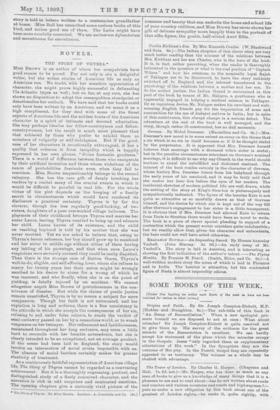NOVELS.
THE STORY OF THYRZA.* Miss BROWN is an author of whom her compatriots have good reason to be proud. For not only is she a delightful writer, but she writes stories of American life as only an American can. No doubt, with her sensitive appreciation of character, she might prove highly successful in delineating Cis-Atlantic types as well; but so far, at any rate, she has shown no disposition to adopt the cosmopolitan standpoint or denationalise her outlook. We have said that her books could only have been written by an American, and we mean it as a high compliment, for they deal with some of the finest aspects of A mule= life and the noblest traits of the American character in a spirit of intimate and devoted admiration. She may perhaps idealise her fellow-countrymen and fellow- country women, but the result is much more pleasant than that achieved by those who prefer• to exhibit them as monsters of vulgarity or self-indulgence. But if the good- ness of her characters is occasionally extravagant, it has a quality that redeems it from insipidity which is happily expressed in her own phrase, "divine fantastic goodness." There is a world of difference between those who exasperate by their artificial invention and those whose violations of the canon of probabilities fascinate even when they fail to convince. Miss Brown unquestionably belongs to the second category. She has the rare gift of deeply touching her readers by a recital many of the crucial events in which it would be difficult to parallel in real life. For the whole virtue of the plot depends on the keeping of a family secret in circumstances which would have rendered its disclosure a practical certainty. Thyrza is by far the cleverer, though the less regularly good-looking, of two sisters, daughters of a poor overworked village tailoress. The playmate of their childhood betrays Thyrza and marries her sister Laura, leaving Thyrza unaided to bring up and educate her child. Laura knows of its existence, and the child on reaching boyhood is told by his mother that she was never married. Yet we are asked to believe that, owing to Thyrza's heroic reticence, her boy should grow up to manhood and her sister to middle age without either of them having any inkling of his parentage, and that when once Laura's suspicions were seriously aroused they could be easily dispelled. Then there is the strange case of Barton Gorse, Thyrzit'e well-to-do, eligible, and self-effacing lover, whom she refuses to marry for twenty years lest their union might be wrongly ascribed to his desire to atone for a wrong of which he was innocent, and who finally, when she is on the point of yielding, is fatally injured by an accident. We cannot altogether acquit Miss Brown of gratuitousness in the con- trivance of disaster•. But while the claims of poetic justice remain unsatisfied, Thyrza is by no means a subject for mere compassion. Though her fault is not extenuated, and her expiation is long and arduous, there is a fine consistency in the attitude in which she accepts the consequences of her sin, refusing to sail under false colours, to evade the verdict of semi-outlawry passed on her by a censorious world, or to wreak vengeance on her betrayer. Her refinement and fastidiousness, maintained throughout her long seclusion, may seem a little hard to reconcile with her humble antecedents, but she is clearly intended to be an exceptional, not an average product. If the scene had been laid in England, the story would involve an intersection of social strata impossible with us. The absence of social barriers certainly makes for greater elasticity of treatment.
As a continuously faithful representation of American village life, The Story of Thyrza cannot be regarded as a convincing achievement. But it is a thoroughly engrossing, poetical, and distinguished study of a finely conceived character, and the narrative is rich in odd surprises and contrasted emotions. The opening chapters give a curiously vivid picture of the • The Story of Thyrza. By Alice Brown. Loudon: A. Constable and Co. 1611.1 romance and beauty that can underlie the home and school life of poor country children, and Miss Brown has never shown her gift of delicate sympathy more. happily than in the portrait of that elfin figure, the gentle, half-witted Aunt Ellie.










































 Previous page
Previous page